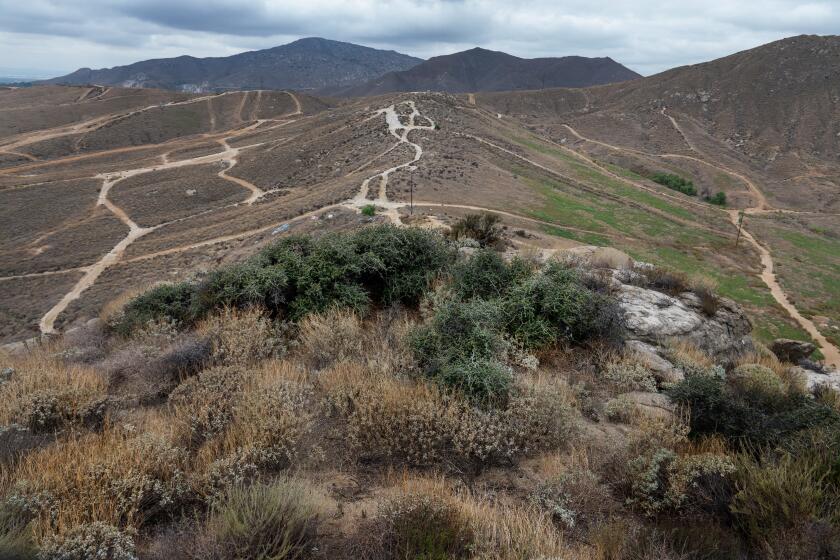Golf’s Night Raiders : Sophisticated Thieves Take Balls From Water Hazards, Prompting Crackdown
One night in July, a sheriff’s deputy patrolling a dark Long Beach golf course watched through binoculars as two men in wet suits scooped up hundreds of golf balls from a pond, stuffed them into a duffel bag and dumped them into the back of a Toyota pickup truck.
When the deputy arrested the pair minutes later, he found 774 wet golf balls in the truck bed, the spoils of the pair’s midnight visits to several courses in the Long Beach area.
Improbable as it may seem, such raids into the murky shallows of golf course water hazards are relatively commonplace--the bootleg side of the highly lucrative golf ball recycling business.
When cleaned, the errant balls that sit by the thousands at the muddy bottoms of course ponds can fetch up to $1.50 apiece. The lure of such profits not only supports a booming legitimate ball recovery trade, it also has elevated illegal ball recycling into a sophisticated enterprise that plagues courses across the nation.
The midnight bandits, or “nighthawks” as they are sometimes called, typically hit two or three courses a night, cutting through fences and using everything from their bare toes to scuba gear to search water hazards while lookouts stand guard.
“It’s a severe problem all over the country,” said Larry Margison, who runs the Golf Balls “R” Us ball retrieval firm in Laguna Hills.
At the Green River Golf Course in Corona, ball thefts have become so commonplace that two night security guards have been hired. “In the last six months we’ve probably caught five (groups of poachers),” said Howard Smith, president of Green River Golf Corp. “One got away but we got the balls.”
Poachers were arrested this year at Indian Wells Golf Resort in Indian Wells. Pismo State Beach Golf Course in San Luis Obispo County has been hit repeatedly.
“We estimate we’ve lost between 8,000 and 10,000 golf balls since the first of the year,” said Steve Zacheis, general manager of the Pismo Beach course. “It’s a nasty, big business.”
One professional diver who makes his living harvesting pond balls for Southern California courses offers a standing reward for information leading to the arrest of the nighthawks who work his ponds.
“They’re taking income away from me and the golf course,” fumed the diver, who did not want to be identified for fear poachers would realize his courses were vulnerable to midnight plundering. “And it’s not nickels and dimes, it’s thousands of dollars a year.”
Retrieval services such as his contract with courses to regularly clean out water hazards. Depending on the agreement, the retrieval company either splits the balls with the course, pays the course for the right to all balls, or turns over the balls to the course in return for a fee.
So when the nighthawks strike, they take with them the profits of the courses and the retrievers. Typically, golf professionals say, the poachers either sell balls in bulk to a middleman for about 15 cents each or sell them directly to other courses, discount stores or golf ranges for a dime to 50 cents.
“The people who do this--as far as I’m concerned--are lowlife,” the diver said. “It’s just like anybody who robs banks.”
An occasional nighthawk in San Bernardino County sees it differently, no doubt mirroring the thoughts of countless golfers who have watched hundreds of dollars worth of balls plop into water hazards.
“The way I figure, I pay anywhere from $15 to $50 to play golf. . . . To pay somebody $50 to walk around their nice green field and lose golf balls in the process--I thought they owe me in return.”
A scuba diving instructor whose nickname is “Riptide,” the sometime nighthawk said he made his first pond foray a couple of years ago. “I did it the first couple of times because I was going to be playing in a golf tournament and couldn’t afford a case of balls. There is this one water hole that keeps claiming my balls, and I figured I’d get them back.”
He donned his wet suit, mask, fins and oxygen tank and plunged in with a mesh bag. “I had no idea what I’d find. I got in and turned on my light and there was nothing but golf balls. And I went, whoa! I can’t believe all these golf balls I have to leave behind.”
He said he has gone ball gathering four or five times, around midnight. “It’s a little easier to run across the course wearing scuba gear (in the dark),” he noted. “It’s really obvious . . . in the middle of the day.”
He favors water hazards to the right of the fairway as “the best yielding.” He sells excess balls to friends for 25 cents each.
“It’s one of those dare things. The thrill of possibly getting caught,” added the 27-year-old, who assumes that a minor trespassing fine is the worst that will happen to him if he is caught.
It might not be so minor. The two men picked up in Long Beach at Heartwell Golf Course were each fined more than $600 for trespassing. They were arrested for theft, but the Long Beach city prosecutor concluded that the ownership of the golf balls was too murky an issue to press theft charges and filed the trespassing complaint.
The two, both from Mission Viejo, insisted to the sheriff’s deputy that the 774 golf balls “did not belong to anyone” and were in “eminent domain,” according to the arrest report. Not so, say course operators and retrieval services, who argue that pond balls are the property of courses, and anyone caught taking them should be prosecuted for theft.
But the golf ball losses are not always a big priority for prosecutors often overburdened with more serious crimes. Margison, of Golf Balls “R” Us, said: “A lot of district attorneys look upon it as a joke.”
More to Read
Start your day right
Sign up for Essential California for news, features and recommendations from the L.A. Times and beyond in your inbox six days a week.
You may occasionally receive promotional content from the Los Angeles Times.







